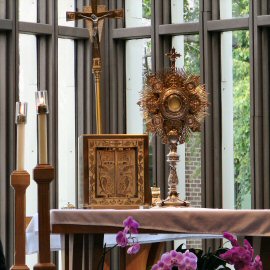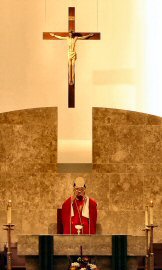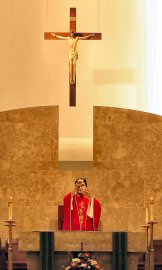
Holy Communion
by Rev. Albert F. Ernst, O.S.F.S.
In India years ago there live a beggar, who would go from door to door, begging bread. One day he heard that the great king, or Maharajah, was coming to his village. He decided to ask for enough money from the king so that he could live in comfort for the rest of his days.
Early the next morning the beggar arose, and with his begging basket he hurried to the main street to be close to the line of march. Soon he heard the cry: “The Maharajah is coming. The great king is coming.” Looking down the street, he feasted his eyes on the gorgeous procession, the glittering trappings, the prancing horses. As the king's chariot approached, the beggar edged his way to the front line. Suddenly he rushed out to the king and held his gaunt hand pleadingly for a gift.
Slowly and thoughtfully the Maharajah turned to the beggar and looked him full in the face. Then the king himself held out his royal hand to the beggar, to ask for a gift. What could the beggar do? What could he give his king? Give he must, but what? Into his begging basket he plunged his hand, found a few kernels of corn and put them quickly into the king’s hand. The king bowed in thanks and the procession moved on.
It took the beggar several moments to recover from the surprise of having the king ask him for something. When he finally came to himself and picked up his basket, he heard the clink of coins. In the basket he found several coins of gold, evidently placed there by some of the king's servants during the brief time when he beggar had given his king what little he had. For those few, almost worthless kernels of corn, the king had given him golden coins.

Our dealings with God are very much like that. We are all beggars. God is the Great King. Of the King we ask favors and blessings. But like the Maharajah, Almighty God turns about and asks us first to give Him something, however small, however worthless, however cheap it may appear. In return for the smallest gift to Him, God gives generously to us.
Why not put forth a little effort, give Him a little of your time and receive His body and blood. Make your Easter duty, receive Him often, and don’t make excuses.
Sometimes you hear fellows say that frequent Holy Communion is alright for women and children, but it is somehow unsuitable for men. The reply is that with God there is no double standard of morality or piety, not one for women and one for men. Prayer and the sacraments are the means of grace alike for men, women and children. Because some men feel they are more exposed to temptation than women, Holy Communion provides them with a supreme remedy against all temptation. There is no bad habit which can long resist the sledge hammer blows of this sacrament. It is a complete misconception of the purpose for which Christ instituted the Holy Eucharist to think that it is meant chiefly for women and children. It is meant for all and especially for those who are exposed to danger. It is their best fortification.
Another objection is, I do not have sufficient time for proper preparation for Holy Communion nor for thanksgiving afterwards. Hence, I cannot receive. True, there should be due preparation. But does this mean the recitation of many prayers, and the performance of many devotional exercises? Not at all. One of the best preparations for Holy Communion is a good life and the sanctifying of our ordinary daily actions. Moreover, “Frequent Communion is the best preparation for communion as well as the best thanksgiving. A thanksgiving for the one we received yesterday and the Communion of today is the best preparation for the Communion of tomorrow.” "Therefore,” says St. Alphonsus Ligouri, “If you have not time to prepare yourself in consequence of some good work or some duty of your state of life, do not abstain from Holy Communion on that account. Only take care to avoid useless conversations and occupations that are not urgent.”

If you are pressed for time it will still be possible to make the immediate preparation while going to the church and to continue the thanksgiving on the way home or work. There are two axioms or sayings that apply here, namely, “Where there’s a will there is a way,” and, “Love will find a way.” The individual who has once experienced the warmth and intimacy of daily or weekly union with Christ in Holy Communion will laugh at the trivial excuses which deter the faint hearted and the indifferent.
Some people object to going to Holy Communion frequently because as they say, “I am afraid of losing my respect and devotion for Holy Communion by too great a familiarity. The reception will become too much of a mechanical routine.” Loss of devotion, it is true, will result from improper preparation. But if one prepares devoutly for Holy communion the frequent reception will deepen the sentiments of reverence and love. Familiarity in the sense of intimacy and union with Christ should not be disapproved of because it is the very purpose and end of all prayer and spiritual exercises. In regard to routine, two kinds are to be distinguished; one is objectionable and the other favorable. The one which is objectionable is the purely mechanical reception of the sacrament with an attitude of irreverence or at least of indifference, in short, with an absence of a right and devout disposition. This attitude is the very opposite of the one produced by frequent Holy Communion when care is taken to prepare properly for this great act. Those who prepare properly and go to Holy Communion frequently do not get tired of it but long for it more and more. Our Lord told us that this would happen when He said, “They that eat Me, shall yet hunger; and they that drink Me, shall yet thirst.” This saying reflects the experience of every devout recipient of frequent Communion.
The second kind of routine is that which is synonymous with habit. In this sense routine indicates an ease or facility of action which is most desirable in regard to all virtuous deeds. As you will know, it is eminently desirable to make the daily recitation of one’s morning and evening prayers as a matter of routine or habit. So too, it is most desirable to make the devout reception of daily, frequent Holy Communion a matter of habitual practice instead of being dependent upon whims or caprice. The whole aim of the spiritual life is to make the performance of virtuous actions of matter of routine or habit.

Another objection is as follows, “I don’t like going to Communion without Confession and I don’t have either the time or the opportunity to go to Confession every day. The Church teaches that a person may receive Holy Communion repeatedly without going to Confession provided of course that the person is not conscious of any mortal sin. Why then should you insert an action not required by the Church? The Church explicitly states that only three conditions are necessary, mainly, the state of grace, fasting from food and drink for one hour before receiving, and a right devout intention. It is not the mark of a good Catholic to be more exacting than the Church. Consequently one may go to Communion several days or several weeks if he desires on one Confession.
Finally, we have the objection, “I don’t consider myself worthy to receive Holy Communion.” Well, that is true. But who is worthy? Who is worthy to receive God in Holy Communion? Are the saints worthy, the angels, the Blessed Mother? No, none is worthy. That is why wise Mother Church bids everyone, saint and sinner, to repeat with the priest before Communion the humble acknowledgement, “Lord I am not worthy that you should enter under my roof: say but the words and my soul shall be healed.”
These are some of the many reasons people give for not going to Holy Communion. But the Lord says, “Amen, Amen I say to you, except you eat the flesh of the Son of man and drink His blood you shall not have life in you.”
A true friend tries to carry out his friend’s every wish. We are friends of Christ for He Himself has said, “I have not called you servant but friend.” Since this so and since all of us know God’s wish in regard to our reception of Holy Communion what are we going to do? Each person must answer that question for himself. Don’t disappoint Him again.
All of us are experiencing that right now. In return for the effort it took to get to Mass and in return for the little time we are spending in church, God is showering upon us peace of soul and an abundance of His divine grace. In addition to that, many of us will be the recipients of a much greater share of His generosity and goodness because we came prepared to receive Him in Holy Communion. He will give us His own Body and Blood as food and drink. What a delightful gift in return for our cheap, almost worthless one of a little time and effort it took to go to Confession and come to Mass. When we think of this exchange of gifts we ought to be embarrassed. However, we need not feel embarrassed, God wants it that way. An insignificant gift for a divine one. And yet, there are some of us who are afraid to bargain with Him. Please don’t take God for granted.